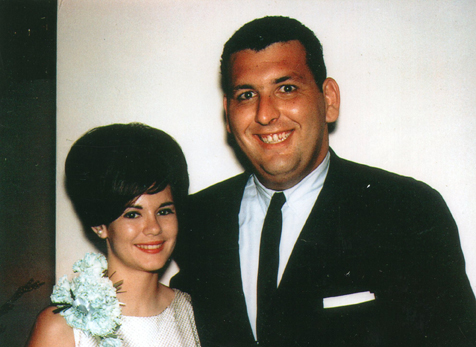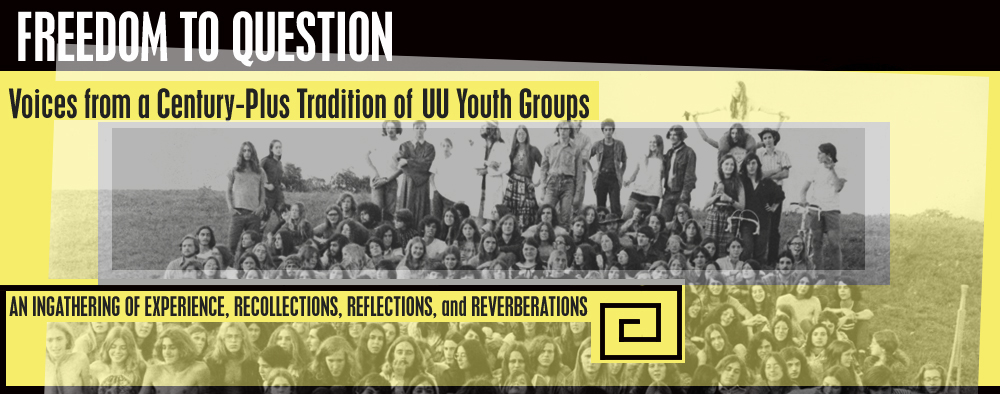Sandy Lotz (now Alexandra Furnari) of LRY (Liberal Religious Youth), Miami, Florida
What was the youth group to which you belonged and what were the years?
First Unitarian Church of Miami, LRY, 60-65.

Alex and Jay at the prom.
Was your family UU (or Unitarian or Universalist) and what was their generational history as far as involvement in UU? Had family members been involved in former UU or Unitarian or Universalist youth groups and do you know what their experience might have been? If you were from outside UU, what was your religious/spiritual/social upbringing?
My parents and I had belonged to a number of churches during my elementary school years, Congregational, United Methodist, Presbyterian, etc. Sometimes it depended on where my father sang in the choir. I also was exposed to Judaism as my father was hired to sing as a Cantor during High Holy days, at Bar mitzvahs, etc. But when I was in 7th grade we moved to south Dade and friends invited my father to come to the Unitarian church. He and I joined and attended regularly. My mother was never very interested in religion but did attend occasionally. At the time the church was near downtown and unfinished as during the construction they found that the state would be putting an interstate through the site. Ultimately the church moved to temporary quarters and then built at the current site off the Palmetto expressway and Sunset Dr. My father became President of the church and I became President of LRY in my Jr. year of high school. That year LRY got a new advisor, Jay Furnari, who was attending the U of M and had been President of LRY during the 50's. While we dated back then we did not get married until 1997. My name then was Sandy Lotz, I am now Alexandra Furnari. I also helped with the Sunday School caring for younger children during the summer time.
How did you learn of the youth group, or what attracted you to it? What kept you there? Why and when did you leave? Did it provide an environment that was missing elsewhere in your life? Were you looking for spiritual experience, social consciousness activities, intellectual stimulation, personal friendships? How were these things fulfilled or not? What growth/change did you feel?
During 7th grade I attended Sunday school classes, Church Across the Street I think was the curriculum. I think in 8th grade I started joining the discussions with the LRY members and an advisor as they had no one to teach classes. I think I continued to be interested, and stayed involved until I graduated, because it was interesting, fun, and an opportunity to be accepted. Like many people I was not in the in-group in high school, and my liberal beliefs were not shared by many in my high school. So LRY was the place where I could be a leader, be heard, and be with people who accepted me for who I was. I met my best friend through LRY and met many people who were wonderful. I think I also had the opportunity to participate in spiritual learning, social consciousness, and intellectual stimulation. The collective experiences influenced my life significantly. During college I was also active in the church in Tallahassee, mostly helping as a Sunday school teacher.
What were your experiences local and non-local? Did you prefer one over the other or did they complement each other well? Was non-local experience accessible?
It was a small group when I was in 8th grade, but by the time I was in 10th grade we had around 20-25 members and were very active, helping to form a south Florida regional group as well as participating in state conferences, I also went to Blue Ridge, a national conference in Minn., and an international conference which included LRY and SRL members in Scotland in 1965. I have a fair amount of photos of the Europeans and U.S. participants. I think the local and going to conferences complemented each other. We did a lot of service projects in our local community, and gained lots of ideas at conferences. Conferences provided lots of fun and getting to know others with similar interests, but they were also a way to get new ideas from other groups.
How did your experiences affect your life in the short term and long term? Were you UU as an adult--why or why not?
I was very active in the Tallahassee church and then I moved to Tampa for grad school and joined the Tampa church and became a volunteer DRE when the church moved from south to north Tampa, and was on the church Board. While I married my first husband in the Miami UU church in 1977 it did not take long for him to pull away from the church, and discouraged me from attending. I did continue to attend occasionally and took my daughter to church school for awhile. When I married my second husband Jay we were married and were active in the Tampa church for several years. But, it started becoming very political in the late 90's, and in particular supporting Muslim causes. After a particularly anti-Jewish event supported by the members we dropped out, and I converted to Judaism. My husband's mother was Jewish and he had attended Temple during most of his adult life until we got back together. We moved to Las Cruces, NM in 2005 to take care of my Mom, first we became active in the Temple, then got involved in the UU church the last year we were there 2011, and it was a great church. While the Tampa church is no longer as political as it once was, we did not feel like we fit in when we visited last year, so we are currently not active in any group.
What was your awareness of the group and its activities as far as being youth-directed and the history of youth-direction in UU youth groups? If you hadn't much awareness of the history of UU youth groups, would you have been interested in learning more? If you hadn't awareness of the history of the UU youth groups, would education in that history have further molded your experience and expectations of yourself and others? Would it have affected a sense of legacy? If you were interested in legacy, did you feel you were able to contribute beneficially or not?
I think I knew relatively little about the history of UU groups, not sure if I would have been that interested while I was in high school. I was aware of the changes that happened in the 70's as my brother David Lotz was 8 years younger than I and was also active in LRY. But his experience was more influenced by the drug culture that got out of control during his years of participation.
What was your sense of youth-adult relations between the youth group and the host congregation? The youth group and advisors?
We were fortunate to have great advisors usually, although most did not stay for more than a year or so. Getting members to be advisors to teens was even more difficult than getting teachers for the younger children. During my years the relationship with the church was good, and the group did projects to help with planting, fund raisers, etc.
It seems to me it would be useful to not just learn what individuals found beneficial or not about their experience in the youth group, but to contextualize it generationally. What was going on in your area outside the group in other formal and informal groups of individuals of similar ages? What was going on societally that you feel affected your experience of and participation in the youth group?
Liberals, particularly those that favored integration and had friends of different races, were not well accepted in the early 60's, there was a lot of racial tension and polarization, although probably not as much as today. I think our church and LRY were very different than groups sponsored by Christian churches. We spoke openly about social issues, with a strong liberal voice mostly, but there were conservatives in the church as well, so there were lively dialogues frequently. But even the conservatives were supportive of civil rights, so that unified the church, and distinguished us from most religious groups. While Miami was certainly not as hate filled as the deep south, there were still people who made life difficult for those who supported civil rights.
Added 2014 Jan 2.
Return to Voices from the '60s.
